ICMIZER vs SNG Wizard
For a few years, SNG Wizard was the most popular and advanced ICM calculator in the market with few competing programs around. However, within the last 2 years a new program called ICMIZER has been introduced which has already gained some popularity and attention. Several evaluations and comparisons of ICM programs like SNG Wizard have already been made on the internet, and in this article I am going to provide the most recent evaluation and comparison of the current available features of both ICMIZER and SNG Wizard.
Manual hand range selection tool
For anyone who has experience with either of these programs the obvious function that should stand out in ICMIZER is the manual hand range selection tool. This tool allows you to cherry pick the exact cards to constitute your opponent’s hand range. Along with SNG Wiz, ICMIZER uses the Sklansky-Chubukov model to generate hand ranges. However, the Wizard doesn’t allow you to add or subtract hands from your opponent’s range manually and is limited to two sliders which you can use to widen/narrow your opponent’s range or exclude hands from the top end of their range.
Why might this be a problem?
The Sklansky-Chubukov model values big off-suit gappers like K-5o higher than suited connected hands like 98s so will recommend pushing those hands first. In practice, it’s more common than not to observe players pushing suited connected hands like 98s before K-5o as they typically perform better against call ranges and have more post-flop potential. Essentially in Wiz, if you want to include some of the suited connected hands you estimate your opponent will push you’ll have no choice but to include all of the big off-suit gappers since you’re limited to a scroll and this may not be indicative of your opponent’s true range meaning the calculation will produce inaccurate results.
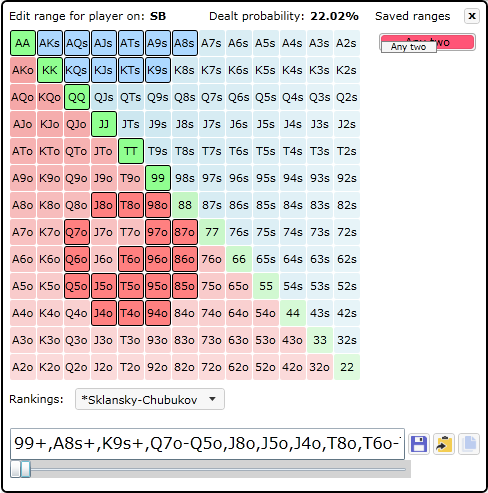
Consider this example:
Your opponent is pushing into you, blind on blind, for 10bbs and you estimate he’s pushing around 50% of cards. Evaluating this in the Wizard, the Sklansky-Chubukov ranking for 50% of cards extends to K2o/Q5o/J8o and 98s in terms of suited hands. It may be however you estimate your opponent is indeed pushing 50% of cards but a range of a different selection, for example, hands such as 97s/87s/67s before the likes of K2o and Q5o. Evaluating this in ICMIZER, it’s simple enough to remove those hands from the range with the click of a button whilst adding in the suited ones. Even though the % may remain the same – 50% in the example we’ve used, the selection of cards that constitute that 50% differ which means if you perform a calculation in ICMIZER it will produce different results, and more importantly, more accurate results. Even some small tweaks can have pretty big implications which can affect your long term profitability.
In short, with the ability to manually input your opponent’s range and make adjustments, ICMIZER allows you to assign your opponent’s more realistic ranges in turn producing more accurate results.
The Nash Equilibrium calculator
Unlike SNG Wizard, ICMIZER has an in-built Nash Equilibrium calculator function which allows you to generate optimal (Nash) ranges by accounting for the pay-out, stack sizes and blinds of the tournament. This is a very useful feature since it allows you to understand what ranges are optimal in different spots and generally what players will be doing if they are adopting this strategy. In other words, if you were playing with the very best players you’ll gain insight into their ranges and be provided with solutions on how to adapt accordingly.
Moreover, ranges can be generated for each individual player at the table and not just the hero or player in action, and the calculator can be used for the majority of SNG or tournament spots that arise. To carry out this calculation in the program all you have to do is hit the “calculate Nash Equilibrium” button and the Nash ranges for each of the stacks will instantly be assigned. To read more on Nash Equilibrium and the Nash Equilibrium calculator feature in ICMIZER read this article: Nash calculator
Accounts for tied pots
When SNG Wizard runs a calculation, it takes into account the probability of winning and losing. ICMIZER on the other hand accounts for the probability of winning, losing as well as tieing. Since ICM doesn’t like busting, the ranges the Wizard produces will be more conservative since it fails to account for the times you chop the pot therefore assumes you bust more often than you actually would.
Let’s consider the following two examples:
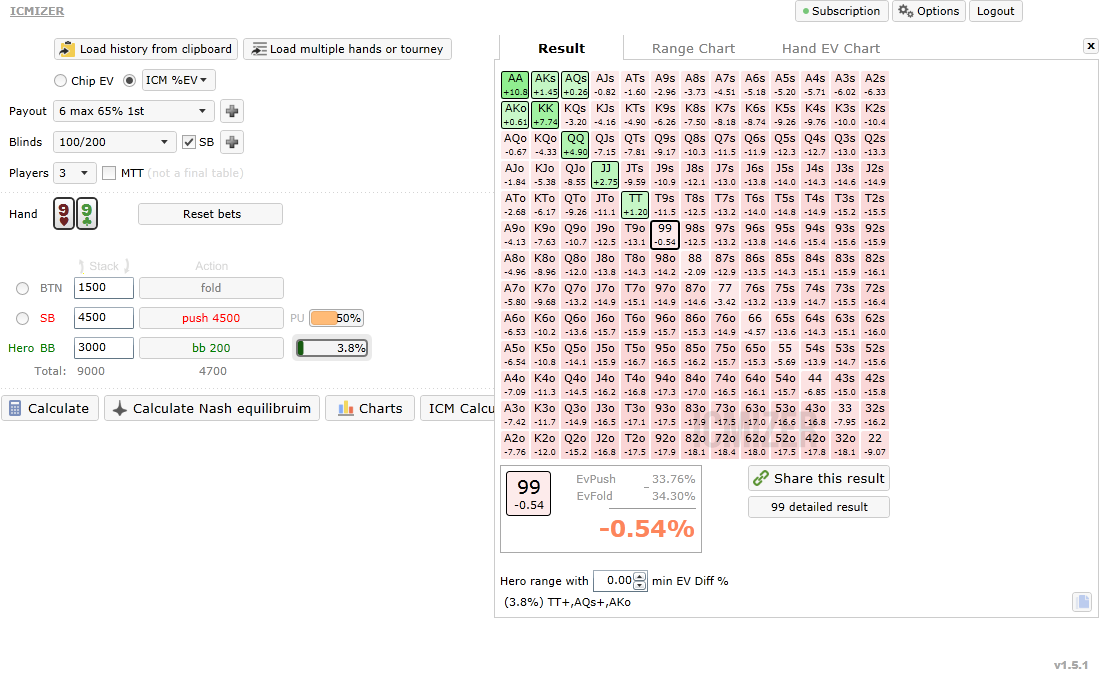
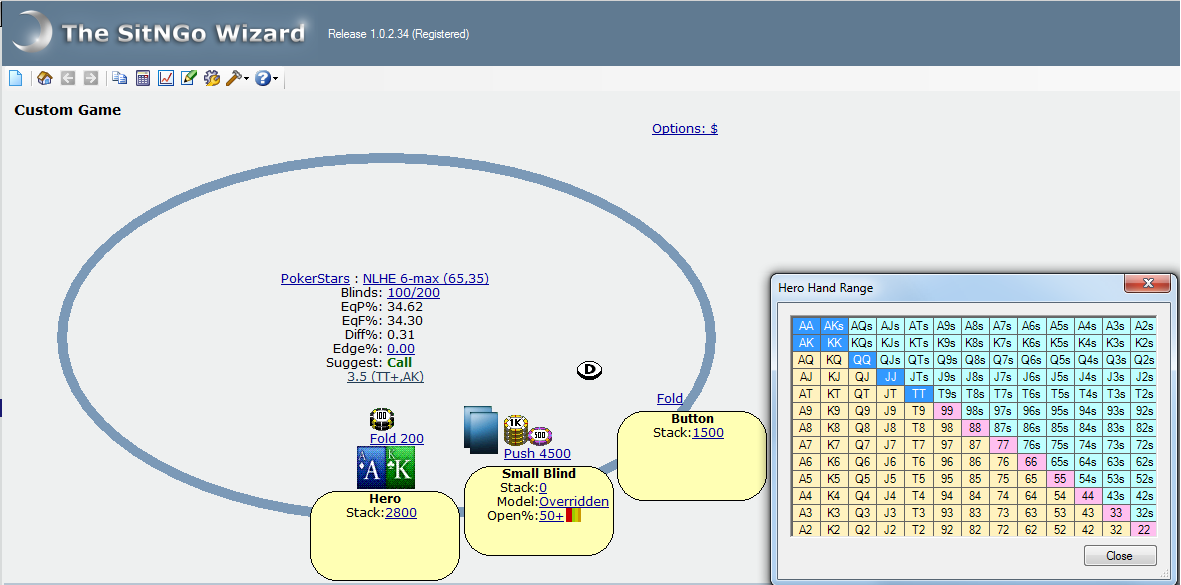
As you can see, the exact same calculation has been run through both programs but the end results are slightly different. According to Wizard, you can call off with 10s+/A-Ko/A-Ks whilst ICMIZER says you can also call with A-Qs. There are also subtle differences in the EV of some hands: A-Ko wins 0.31% in Wiz, and yet 0.61% in ICMIZER whilst calling off with A-Qs costs 0.05% in Wiz yet wins 0.26% in ICMIZER. This difference in these ranges and the numbers is a result of the Wizard failing to compensate for the times you’ll split the pot. Indeed, the difference is very small and in this specific example there’s only one additional hand you would call off with but poker is a game of small edges and these are the things that will help maximise your winnings in the long run.
In short, since ICMIZER is able to calculate all the potential outcomes of a hand the resultant ranges won’t be as conservative as the Wizard’s and will be more accurate.
Flexibility of pre-flop situations
There are several restrictions in the flexibility of calculations SNG Wizard is able to produce. In SNG Wiz, calculations are based around the hero and it is unable to handle any spot with more than 2 actions pre-flop involving the hero – once the hero has put chips in the pot no further actions can be accounted for. ICMIZER offers a lot more flexibility and is capable of computing almost any pre-flop situation.
Let’s consider a few different situations where these limitations come into play:
Raise-call function
Since we’ve established no more actions can be accounted for once the hero has put chips in the pot, the Wizard is unable to calculate raise-call/inducing spots i.e. the hero opens with a raise and then faces a shove. ICMIZER on the other hand has a raise-call function which is very useful since you can calculate exactly what you can profitably induce with against an opponent once you open and they shove. To make this possible in the Wizard, you would have to re-arrange the stack sizes and situate the hero in the BB facing a shove. Unless you can alter the blinds to replicate the scenario to the exact, this will produce inaccurate and if anything, more conservative results since the pot odds will be different as the hero will have fewer chips invested.
Let’s firstly take a look at an example in ICMIZER:
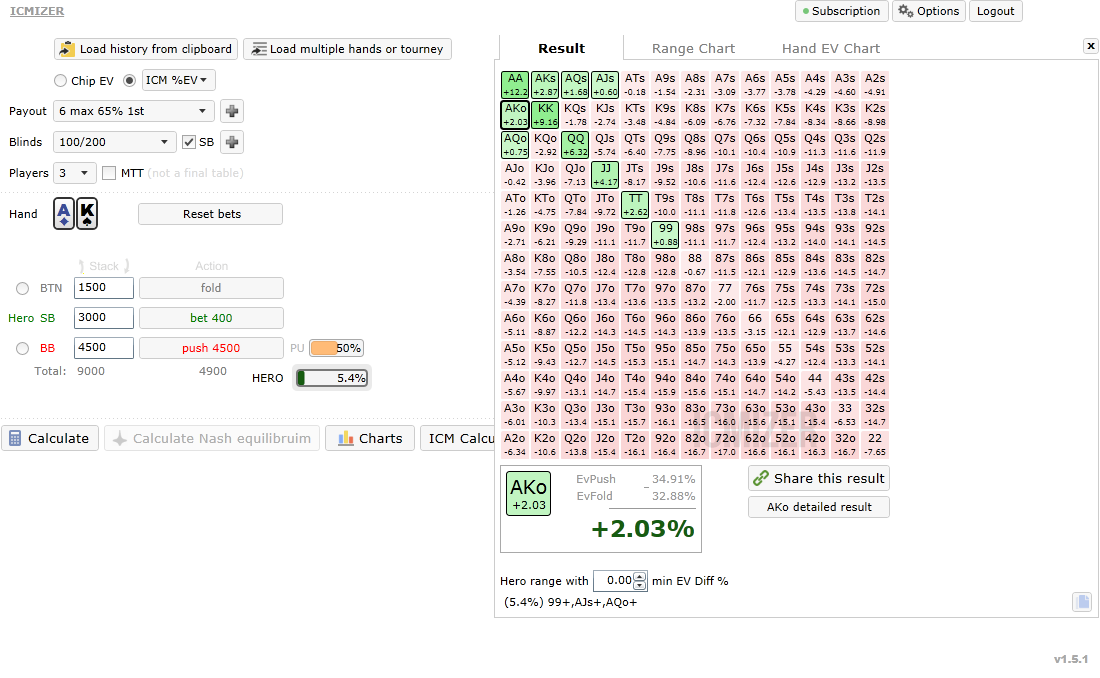
As you can see, the range we can profitably call off with in this spot is 9+/A-Qo+/A-Js+. To replicate this in the Wizard, we would need to place the hero in the BB and facing a jam from the SB. Let’s take a look:
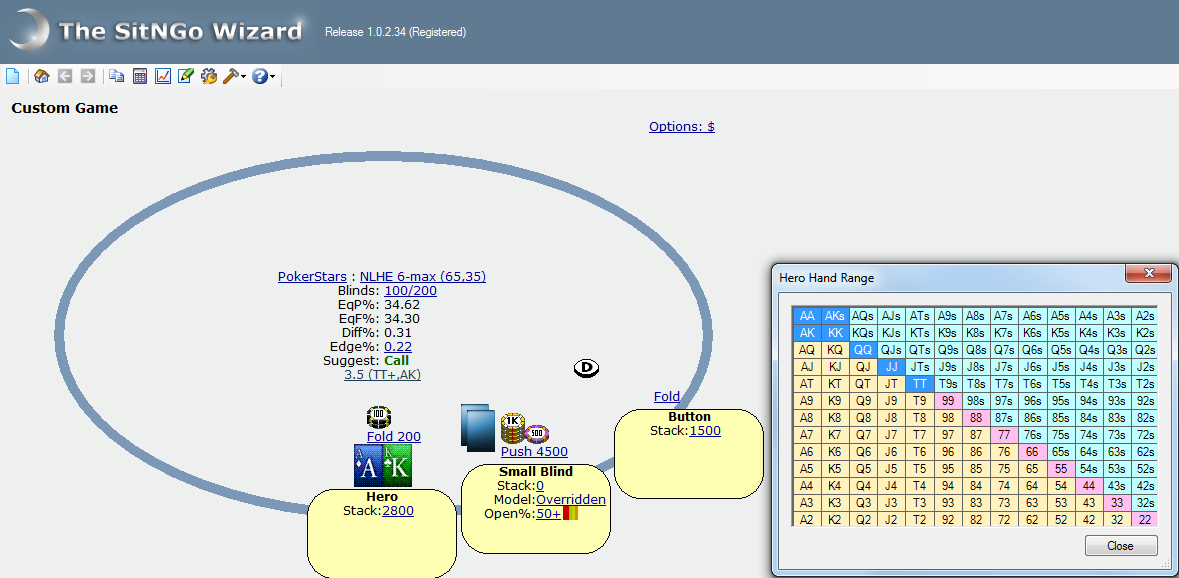
And as expected, the range to call off is more conservative at 10s+/A-Ko/A-Ks. This is due to inferior pot odds as a result of not being able to perform the correct calculation along with not accounting for the times the pot chops. On the contrary, ICMIZER is accounting for the superior pot odds and understands the disparity between the 2nd and 3rd stack isn’t as great now once the hero has opened with a raise.
Non-all in shoving
There are also more complex situations where SNG Wizard is restricted. For example, consider this 6max bubble situation:
Blinds: 100/200
BTN: 850
SB: 2850
BB: 5300
Now, let’s suppose the hero is on the BTN in this hand and decides to non-all in shove for 800 chips. Then something rare happens, the SB shoves all-in and the BB shoves all-in over the top. It may appear very unclear what to do with the majority of your holdings – your pot odds will be superb and if you win you will triple up. On the other hand, if you commit you will need to overcome both the mid-stack and the big stack to stay in the tournament, and if you fold you will only need the big stack to beat the mid-stack to coast into the money.
Now, SNG Wizards design doesn’t allow for this kind of situation to be analysed since there are multiple actions pre-flop after the hero has committed chips. This means if you relied on the Wizard you will need to do manual longhand written ICM calculations to get any answers for this kind of spot. Not only might this be boring as well as time consuming but it will be difficult to know with any degree of certainty if the results are accurate since these calculations are usually fairly complex. Using ICMIZER, this situation is analysable so can be input straight into the program producing immediate results:
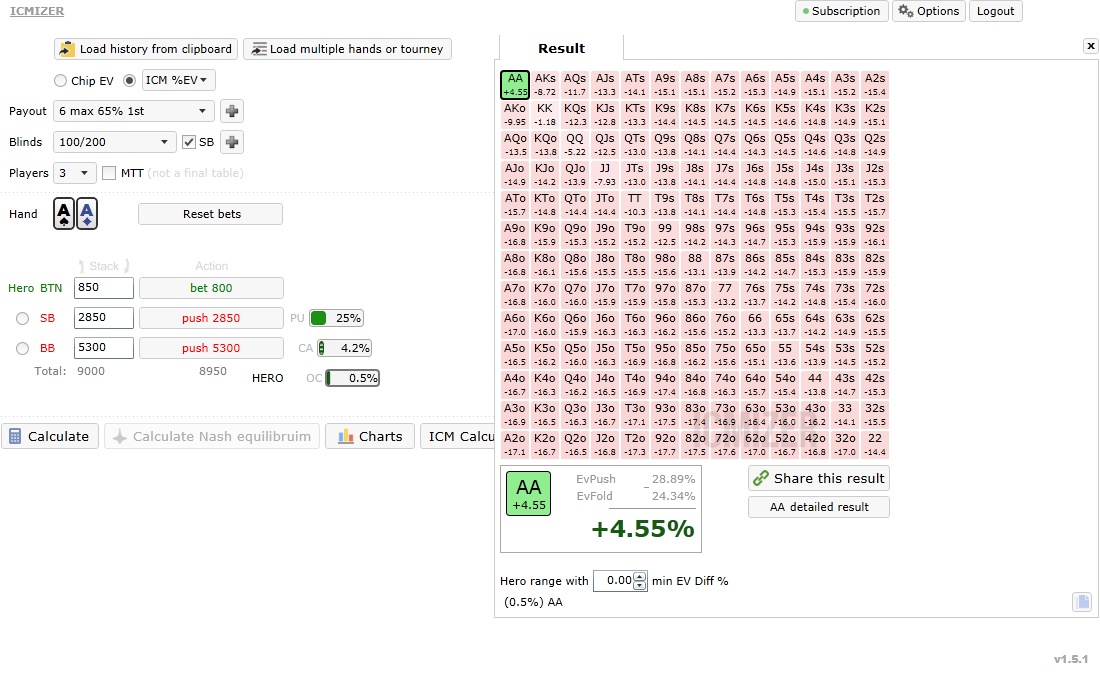
MTT ICM calculator
ICMIZER also has a unique built-in MTT ICM calculator which allows non final table spots to be analysed. Calculations can be performed for up to and including 60 players. This is very useful since ICM very much exists before final table play. For example, it may be that you are clear short stacked on your current table, but it may be there are many other shorter stacks across all combined tables and so what would appear a clear shove on a single table tournament may be a clear fold once accounting for ICM dynamics.
Let's consider a practical MTT scenario with a few hundred participants:
Pay-out: Top 36
Total number of players left: 29
Number of tournament tables: 4
Blinds: 2000/4000
Stack size: 55k
Average stack at table: 115k
Average tournament stack: 64k
So, when we look at this situation we are clear short stacked at our table with less than half of the chips of the average stack. This means treating the situation as a single table we would be pushing very wide and calling off wide with just shy of 14bbs. However, with the other tables in play our stack size is actually very close to the average tournament stack (in this case it's obvious we have drawn a table with some bigger stacks) and so it may be correct to fold some strong hands in order to move up the pay-out structure and make more money (by allowing other players to collide and bust). By inputting the number of remaining players, average stack size and total number of chips in play of the tournament, ICMIZER is able to calculate the push-fold spots of your table, taking into account the entire ICM of the tournament.
There is a detailed article about MTT ICM calculator feature.
Future development
ICMIZER is currently in active development so promises several exciting upcoming features. Amongst these is a Future Game Simulation (FGS) feature so keep an eye out for that. This feature should be a nice addition to ICMIZER as it will be able to perform calculations based on the probability of various future outcomes and factor this into its results – for example, you’re short stacked in early position with the BB approaching – ICMIZER will recognise this and accordingly suggest you push wider.
SNG Wizard which hasn't been updated with any new menacing features for a few years plans to allow manual range editing and account for tied pots in the release of SNG Wizard 2 which at the moment has a very unclear release date.
Conclusions
It is clear that both SNG Wizard and ICMIZER are both very useful programs that are worthy of purchase. Using either of these programs on a consistent basis will undoubtedly improve your knowledge of ICM and consequently your push-fold game towards the latter stages of a SNG or tournament. In conclusion, with the ability to manually input your opponent's range, run Nash Equilibrium calculations, gain more accurate results from precise calculations, perform a wide array of pre-flop calculations as well as calculate non final table spots in MTTs, it is also clear that ICMIZER is one step ahead.
Live long and prosper
MikeyMcD45
Related articles
Article: Sng Wizard results accuracy vs ICMIZER results
Article: Short stack strategy on the bubble, by MikeyMcD45
Article: Super short stacked pushing tactics on the bubble, by MikeyMcD45